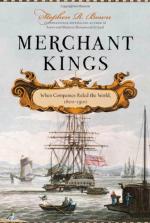|
This section contains 1,346 words (approx. 4 pages at 400 words per page) |

|
Chapter 3 Summary and Analysis
After the Dutch massacre of English at Ambon in 1623, the English fled from Indonesia, and trade fell by 60%, but the English East India Company kept up trade in India. In the early 1600s, William Hawkins had established a trading post in northwest India. Indian trade developed slowly, and with revenues falling because of the English Civil War, a governor of the company proposed a liquidation in 1657. Oliver Cromwell proposed a new charter, though, along the lines of the VOC joint stock company.
The new company, the English East India Company, resembled the VOC in devoting resources to common goals like fortifications, factories and defense forces. When Cromwell died, Charles II gave the English East India Company a new charter that gave it power to wage war, in addition to trading.
The English East India Company discovered resources in India, specifically textiles...
(read more from the Chapter 3 Summary)
|
This section contains 1,346 words (approx. 4 pages at 400 words per page) |

|




